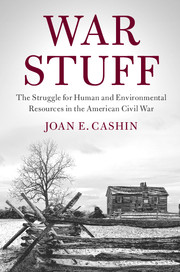
- Publisher:
- Cambridge University Press
- Online publication date:
- August 2018
- Print publication year:
- 2018
- Online ISBN:
- 9781108332750

In this path-breaking work on the American Civil War, Joan E. Cashin explores the struggle between armies and civilians over the human and material resources necessary to wage war. This war 'stuff' included the skills of white Southern civilians, as well as such material resources as food, timber, and housing. At first, civilians were willing to help Confederate or Union forces, but the war took such a toll that all civilians, regardless of politics, began focusing on their own survival. Both armies took whatever they needed from human beings and the material world, which eventually destroyed the region's ability to wage war. In this fierce contest between civilians and armies, the civilian population lost. Cashin draws on a wide range of documents, as well as the perspectives of environmental history and material culture studies. This book provides an entirely new perspective on the war era.
Winner, 2019 Outstanding Publication Award, Ohio Academy of History
Finalist, 2019 NJCWRT Book Award, North Jersey Civil War Round Table
Winner, 2021 Firebird Book Award in the History/United States category, Speak Up Talk Radio
'Expertly researched and beautifully written, War Stuff is a must-read for anyone interested in the Civil War and for all who wish to understand the fascinating, complex ways that war (any war) can fundamentally alter the manner in which humans interact with each other and with the natural world. Integrating material culture, environmental history, and war and society studies, Cashin’s book is a tour de force that will shape Civil War studies for years to come.'
Lisa M. Brady - author of War Upon the Land: Military Strategy and the Transformation of Southern Landscapes during the American Civil War
'With eloquent prose and rich detail, this book - the first full environmental history of the Civil War - demonstrates the staggering ecological costs of the conflict and the utter failure of courts and politicians to safeguard civilians in the face of inadequate supply lines and a breakdown in military discipline. In this brilliant examination of the intimate connections between military and environmental history, one of the preeminent historians of the Civil War era offers strikingly original insights into how the struggle for resources and logistical challenges shaped military tactics, civilian morale, class and race relations, and the future of the South’s economy.'
Steven Mintz - University of Texas, Austin
'This important book makes us aware, as never before, of enormous civilian suffering during the Civil War. It invigorates Civil War studies by treating military history, material culture, the environment, gender, cultural history, and military-civilian relations from a fresh perspective and in a deeply researched manner. Cashin shows that in both sections, but especially in the South, soldiers ruthlessly competed with civilians for resources. The consequences included widespread hunger, starvation, deforestation, the invasion and destruction of many homes, and the breakdown of long-established patterns of communalism in the South. This is an outstanding work by an energetic, insightful, and accomplished scholar.'
Paul D. Escott - Wake Forest University, North Carolina
'… immensely rewarding.'
Source: War History Online (www.warhistoryonline.com)
'Cashin’s work makes a valuable contribution to the study of the impact of the war on the Home Front, and how morality rapidly deteriorates in wartime.'
Source: The NYMAS Review
'Makes a valuable contribution to the study of the impact of the war on the Confederate Home Front, and how morality rapidly deteriorates in wartime.'
A. A. Nofi Source: Strategy Page (www.strategypage.com)
‘In War Stuff Joan E. Cashin explores the consequences of foraging, requisitioning, and sometimes just plain stealing by Union and Confederate troops during the Civil War … Lost Cause mythology obscured the role of slavery and white supremacy, and it erased the memory of what white Southerners did to one another during the war. They ‘lost the ability to tell the truth about what happened to them,’ Cashin concludes, ‘namely that the rebel army exploited the civilian population and its material resources to the full, just as the Yankee army did’ … War Stuff returns that story to the forefront in desperate, compelling detail.’
Brian Allen Drake Source: The Journal of American History
‘This is a valuable book that reopens a worthwhile discussion of the excesses of the Civil War.’
Evan Kutzler Source: H-Environment
‘… at once a textured and nuanced read, and an elegantly and convincingly argued book … This wide-ranging book brings together diverse sources from a broad range of contexts - letters, diaries, legal records, newspaper accounts, government claims, and material sources - to detail the great environmental and human impact of the Civil War. It continues to broaden the lens of focus away from battles and conflict to consider the lived experience of the Civil War and its aftermath, especially the shared experiences of depravation of secessionist and Union sympathizers living in the South.’
Sarah Anne Carter Source: The American Historical Review
 Loading metrics...
Loading metrics...
* Views captured on Cambridge Core between #date#. This data will be updated every 24 hours.
Usage data cannot currently be displayed.